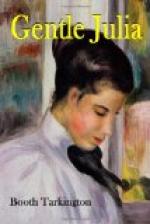Julia smiled faintly as she watched Mr. Sanders, who seemed not yet to be aware of her, because he thought it would be better to reach the gate and lift his hat just there. “What has brought on all this tenderness in favour of Mr. Dill, Florence?”
Her niece’s eyes, concentrated in thought, then became dreamy. “I like him because he’s so uncouth,” she said. “I think he’s the uncouthest of any person I ever saw.”
“’Uncouth’?”
“Yes,” said Florence. “Herbert said I was uncouth, and I looked it up in the ditchanary. It said, ’Rare, exquisite, elegant, unknown, obs, unfamiliar, strange,’ and a whole lot else. I never did know a word that means so much, I guess. What’s ‘obs’ mean, Aunt Julia?”
“Hush!” said Julia, rising, for Mr. Sanders had made a little startled movement as he reached the gate and caught sight of her; and now, straw hat in hand, he was coming up the brick walk that led to the veranda. His eyes were fixed upon Julia with an intensity that seemed to affect his breathing; there was a hushedness about him. And Florence, in fascination, watched Julia’s expression and posture take on those little changes that always seemed demanded of her by the approach of a young or youngish man, or a nicely dressed old one. By almost imperceptible processes the commonplace moment became dramatic at once.
“You!” said Newland in a low voice.
And Julia, with an implication as flattering as the gesture was graceful, did not wait till he was within reach, but suddenly extended her welcoming hand at arm’s length. He sprang forward convulsively and grasped it, as if forever.
“You see my little niece?” Julia said. “I think you know her.”
“Know her?” Mr. Sanders repeated; then roused his faculties and gave Florence a few fingers dangling coldly after their recent emotion. “Florence. Oh, yes, Florence.”
Florence had not risen, but remained seated upon the steps, her look and air committed to that mood of which so much complaint had been made. “How do you do,” she said. “There’s Mr. Ridgely.”
“Where?” Newland asked loudly.
“Comin’ in at the gate,” said Florence. “He’s goin’ walkin’ with you, too.”
In this crisis, Mr. Sanders’s feeling was obviously one of startled anguish. He turned to Julia.
“Why, this is terrible!” he said. “You told me——”
“Sh!” she warned him; and whispered hastily, all in a breath: “Couldn’t-be-helped-explain-next-time-I-see-you.” Then she advanced a gracious step to meet the newcomer.
But the superciliousness of Florence visibly increased with this advent: Mr. Ridgely was easily old enough to be her grandfather, yet she seemed to wish it evident that she would not have cared for him even in that capacity. He was, in truth, one of those widowers who feel younger than ever, and behave as they feel. Since his loss he had shown the greatest willingness to forego whatever advantages age and experience had given him over the descendants of his old friends and colleagues, and his cheerfulness as well as his susceptibility to all that was charming had begun to make him so famous in the town that some of his contemporaries seemed to know scarce another topic. And Julia had a kinder heart, as her father bitterly complained, than most girls.




